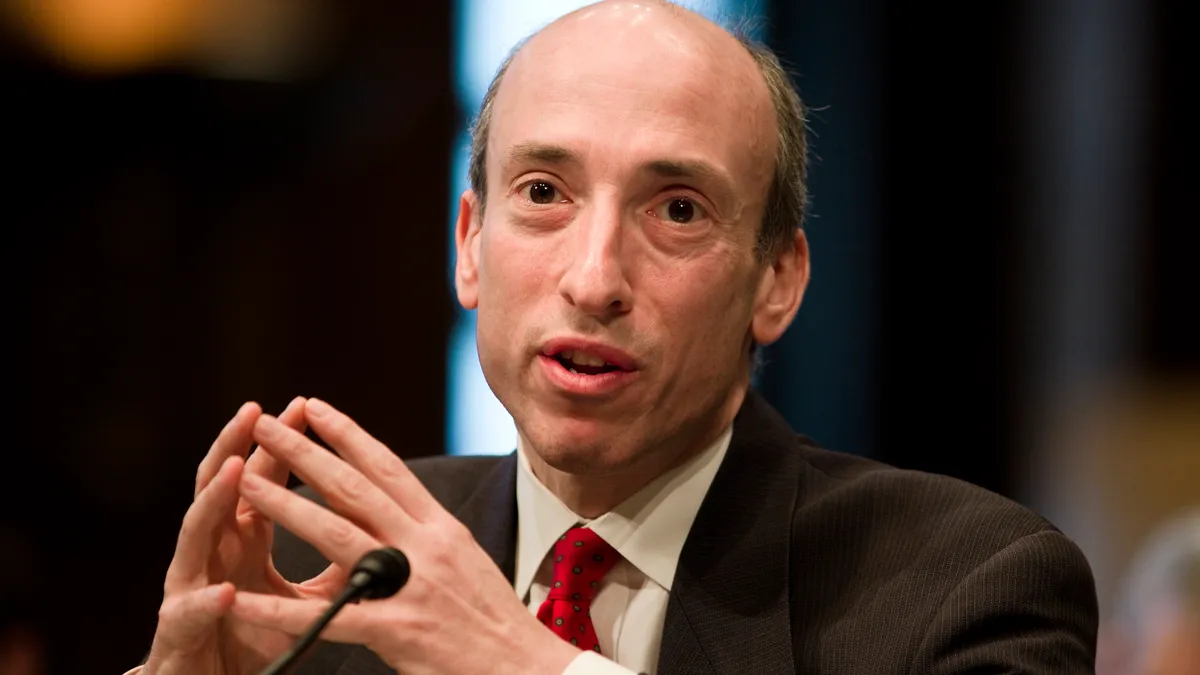Dive Brief:
- Securities and Exchange Commission Chair Gary Gensler told a congressional committee Tuesday that the agency is not aiming to set federal policy on combating climate change as it revises a proposed rule requiring publicly-traded companies to disclose in detail their carbon emissions and climate risks.
- “We’re not a climate policy agency,” Gensler said in testimony before the House Financial Services Committee. “This is about companies that are already making disclosures [about climate risk], and trying to bring some consistency to that disclosure.”
- The SEC has received “15,000 comments on the investor side and it’s almost uniformly supportive of mandating climate risk disclosure,” Gensler said. “Many of the comments we received from actual investors have said they would like to have better consistency around greenhouse gas emissions,” he said, acknowledging that comments from companies have been mixed.
Dive Insight:
The SEC has indicated that it plans before May to release a final rule mandating that companies describe on Form 10-K their strategy toward climate risk, including plans to achieve any targets they have set for reducing such risk. Gensler on Tuesday did not say whether the agency would meet that target date.
Companies would need to disclose data on their greenhouse gas emissions, either from their facilities (so-called Scope 1 emissions) or through their energy purchases (Scope 2). They would also need to obtain independent attestation of their data.
Gensler came under fire from Republican lawmakers who said the SEC was exceeding its authority and would impose a disclosure burden that, while excessive for all companies, would be especially onerous for small businesses and farmers.
“The SEC has no business enacting climate policy,” Rep. Alexander Mooney, R-W.Va., told Gensler.
“No matter what changes are made to the rule, it’s rotten to the core and should be rescinded entirely,” Mooney said. “The SEC and the Biden administration must end its war on fossil fuels and return to focusing on the needs of investors, not activists.”
Gensler faced some of the harshest criticism for planning to require some companies to disclose so-called Scope 3 carbon emissions by suppliers and vendors across their supply chains.
“The SEC’s climate risk disclosure rule would have major consequences for the businesses across the country, especially smaller entities who lose out on opportunities because they cannot afford the increased compliance costs,” Rep. Roger Williams, R-Texas, told Gensler. “This would be detrimental for companies and will stifle innovation and businesses’ ability to grow.”
Democratic lawmakers defended the SEC’s proposed disclosure requirement, asserting that the rule would further the interest of working Americans and help curb harm from climate change.
“Although the cheerleaders for Big Oil want to weaken this rule, the consequences are clear,” Rep. Ayanna Pressley, D-Mass., said. “Without a comprehensive climate disclosure regimen, we will fail working class people throughout our country.”
“This is not the time to backtrack and to weaken regulations,” she said. “Now is the time for action, and to put people over polluters.”












